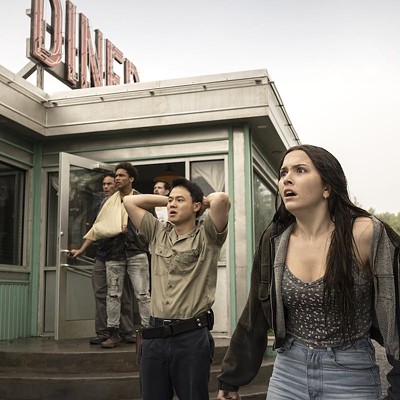George W. Bush Jr. grows up knowing the saying that power equals respect. He gets his power, and that's the reason Oliver Stone's W. is a tragedy. Bush is mainly concerned with how he can assert himself. Driven by his father's expectations, the world turns against him.
By affording Bush these attributes, Stone doesn't take the demonizing route that some might expect. Sure, there's a place in life for the vitriol in Rage Against the Machine, Jon Stewart and Michael Moore, but it's still two-dimensional. As an artist, Oliver Stone accepts the uncomfortable truth that our enemies are human. Simply ridiculing Bush is too easy. It's not sufficient reason to make this movie at this time. W. examines the soul of the 21st century's most prominent cretin.
Except for Alexander (which still maintained his power-overkill themes), Stone's filmography is a mythic take on the past 50 years of American history. This is the emotion and spirit that live beneath the surface events: It's what separates movies from television news. The test of any biopic is whether it would be as interesting if it were fiction. W.'s tale of a regular Texas frat boy who forms his own "axis of evil" as the head stooge in the White House is fascinating character-based storytelling.
Repeatedly, Stone places us within Bush's troubled mindset---even including a dream sequence that makes a near-perfect climax. In the title role, Josh Brolin finds Bush, not through imitation and ridicule, but the sometimes laughable persistence of a man in over his head, but too arrogant to notice. Stanley Weiser's script dispenses with straight chronology. Bush's early life alternates scenes of him in power; moments from the recent past complemented by ones of the distant. He's a beer-swilling cowboy---a disappointment to his parents---when he's introduced to Laura at a barbecue. In his later cabinet meetings, he's bemused by the power he holds. It's a far cry from his impotent rage over his father's second-term loss to Clinton, an event Stone paints as a major catalyst to fulfilling Bush Jr.'s assertion: "There's no way I'll ever be out-Texased or out-Christianed again."
Any disappointment with W. has nothing to do with over-ambition. If anything holds Stone back from making it the ultimate expose of our era, it's that it isn't grand enough. No two '90s movies represented that decade's western culture better than Natural Born Killers and Any Given Sunday. But since the homophobic dismissal of the epic Alexander, Stone's projects have gotten more insular. In W., he misses the rollout effect of the Bush administration on the outside world. A standout moment has the president improving PR by visiting a wounded soldier, and then consoling the obviously sickened mother that she's welcome to visit his parents when in Texas. It just doesn't match the psychic jolt of a scene in Nixon where the president is confronted at the Lincoln Memorial by a well-spoken student protester---a politician forced to swallow his own venom without a ready-made answer.
W.'s personal confines interpret our climate through a tale of abused power, and a dream and family name tarnished. What could have been a work of liberal bitterness and mockery is more troubling because it's actually liberal: It's humane.












